- Home
- Marcia Talley
A Quiet Death Page 5
A Quiet Death Read online
Page 5
‘I know. We’re back to Mr Skip No Last Name again,’ I complained, taking a sip of what turned out to be a very tasty mojito, heavy on the lime and crushed mint, just the way I like it.
‘Speaking of Skip, how do you think he’s going to feel if he shows up asking for his Garfinkel bag and finds you’ve gone pawing through it?’
‘Well, I hope he’ll understand that the only reason I was pawing through it, to use your term, is so I could find out who to return the bag to. Besides, you encouraged me to do it, if you recall.’ I stared at the decorative window etched with a map of Ireland that separated our table from the hostess station on the other side of the wall. ‘If only Skip had told me his last name, instead of . . .’ I took another sip of mojito. ‘Well, that’s water under the bridge now. But, oh my God, Paul, he was so horribly injured, I can’t believe he would have survived.’
‘Doctors can work miracles, Hannah.’
‘I just wish certain hospitals wouldn’t be so close-mouthed about everything.’
‘Would you want just anybody prying into your medical history?’
‘No, but . . .’
‘I rest my case.’
‘One thing I don’t get,’ Paul said to me a few minutes later as he cut my portabella burger into pieces I could eat with one hand, while I tried to keep my left elbow elevated above my heart, as per doctor’s orders. ‘Why didn’t this guy, Zan, simply divorce his wife and run off with Lilith? She was single at the time, wasn’t she?’
‘As far as I know.’ I speared a wedge of mushroom and popped it into my mouth.
‘It’s nuts,’ Paul continued. ‘The two were obviously crazy about one another, and, according to the letters, the affair went on for over a decade.’ He shoveled a forkful of mashed potatoes into his mouth. ‘Maybe the wife was rich, and he couldn’t divorce himself from her money?’
I shook my head, chewing thoughtfully. ‘Somehow I don’t think so. In one of the letters Zan beats himself up because even during mass, when he should be thinking pure thoughts, visions of what they did, and the times and places that they did it were running like a movie through his head. I’m one hundred percent positive that Zan was Catholic. In that case, divorce would have been out of the question.
‘In any case,’ I continued, ‘Zan seems to be one of those high-principled “till death us do part” sort of chaps, although he never talks about that, or much about his personal life in any of the letters I’ve read so far. It’s like . . .’ I paused to wipe greasy fingers on my napkin. ‘I’m sure Lilith and Zan discussed these things when they were together, but in his letters it’s like their own private little world.’
‘Are there any letters from Lilith to Zan?’
‘Not a one, but I know she wrote him.’
‘How?’
‘Well, he’d respond specifically to something she’d written to him earlier. Curiously, he seemed to know and be accepted by her grandmother and her uncle. When Lilith’s grandmother turned eighty, for example, Zan asked Lilith to pass on his birthday wishes. There’s nothing about Lilith’s parents, though.’ I waved a French fry. ‘And before you ask, I don’t know their names either, although her parents were most likely Chaloux, too.’
‘You are a poet, and didn’t know it,’ Paul wisecracked.
‘Ha ha ha. After they’d been together,’ I went on, ‘Zan would spend half the letter reminiscing about what they did during their time together, the rest of it anticipating their next rendezvous. I suspect they spent a lot of time in hotel rooms.’ I grinned and waggled my eyebrows. ‘If it weren’t for the postmarks and the letterhead he sometimes used, I wouldn’t have a clue where he was writing from.’
‘Like where?’
‘He used hotel stationery, mostly, so I figure his job – whatever it was – kept him moving. Omaha, Chicago, Dallas, Rome, Mexico City, Paris. I’m trying to put it all together, looking for a pattern.’
I reached into the pocket of my jacket for the vial of pills, shook two out on the table, popped them into my mouth and chased them with a swallow of mojito.
Paul looked up from his shepherd’s pie and gaped. ‘Hannah! Doesn’t the label warn you not to take those things with alcohol?’
I coughed modestly. ‘Of course it does, silly, but they work much better on the pain part if you do. Besides . . .’ I winked. ‘I don’t have far to drive.’
After we finished our main courses, I threw caution to the wind and ordered dessert – bread pudding with Irish Mist custard sauce – and two spoons. By the time I scraped the bottom of the bowl and licked the last of the custard off my spoon, I was feeling no pain. Paul and I walked home slowly, arm in arm, stopping now and then along the way to admire the Halloween displays that were beginning to crop up in some of the shop windows.
Back home, while Paul cleaned up the dishes I’d left soaking in the kitchen sink since lunchtime, I climbed upstairs and sat on the edge of our bed to undress. I managed to remove my shoes, socks and jeans, but discovered that, no matter how hard I tried, I couldn’t wriggle out of my shirt. I was able to slide my right arm out of its sleeve and ease the shirt over my head, but the logistics of threading the cast through the left-hand sleeve had me completely stumped.
‘Come sit with me until the news comes on!’ Paul called from downstairs.
‘The hell with it,’ I muttered to myself. Leaving the shirt dangling from my shoulder, I used my good arm to squirm my butt into some drawstring pajama bottoms. Then I grabbed an XXL navy ‘Fear the Goat’ T-shirt from Paul’s bottom drawer and padded downstairs to join my husband.
When he caught sight of me in the doorway wearing nothing above the waist but my bra and a T-shirt flapping from my shoulder like a flag of surrender, he grinned. ‘Need help?’
‘Got scissors?’
Paul fell back against the sofa cushions and dissolved in gales of laughter. ‘That’s the most pathetic thing I’ve ever seen!’
I stood in the doorway and drooped. ‘I know. I managed to get into the shirt this morning, so I simply don’t understand why I can get out of it now.’
Paul unfolded his long legs, stood, and crossed the room in a couple of long strides. He drew me into his arms, resting his chin on the top of my head. ‘Poor Hannah. I’m not hurting you, am I?’
‘Oh, no. Just the opposite. I’m medicated, remember?’
He lifted my chin and kissed the tip of my nose.
I smiled into his eyes. ‘Thanks, I needed that.’
Paul’s lips found mine and I melted into him, pink fluorescent cast, uncooperative underwear and all.
‘I gather you need help,’ he whispered against my ear.
‘I do.’
Keeping one hand on my waist, his other hand crept around my back, found the hooks on my bra and flicked it open.
‘Clever boy!’ I whispered against his neck. ‘But then, you’ve always been skilled at one-handed bra removal.’
‘Practice makes perfect,’ he said. Still holding me close, he duck-walked me over to the sofa. Soon it was just Paul, me and my pink fluorescent cast. He kissed my forehead, eyes, nose and mouth, then pressed his cheek against mine. ‘God, Hannah, I was so frightened. I don’t know what I’d do if I lost you.’
I wrapped my good arm around his waist and drew him even closer. ‘Turn out the light,’ I ordered as I shimmied along the upholstery until I was lying down.
Paul slipped a pillow under my head and asked, ‘Sure you’re OK?’
‘I’m perfectly OK. Just elevating my arm,’ I said, holding it over my head and out of the way. ‘Doctor’s orders.’
And for several long and blissful moments, Paul swept all my pain away.
Later, as we cuddled on the sofa watching the eleven o’clock news, I found myself drawn to, yet repelled by, the images on the screen. At least they were no longer running wall-to-wall train disaster coverage.
Channel Four was reporting that the driver of the train hadn’t been at fault. He’d not been texting on his cel
l phone, as had been earlier speculated. Indeed, his cell phone had been found tucked away in his backpack. Metal-to-metal compression streak marks proved he’d braked, hard, before the crash.
A news anchor spent several minutes interviewing ‘experts’ who theorized that a signal failure had caused our train to plow into the back of another, even though all the circuits had been checked and replaced following a devastating crash in June of 2009. The NTSB investigation was continuing.
Pictures of the victims scrolled by. The driver, the teacher, the rabbi, the programmer, the Germans and the teen. I gulped, thinking how easily my picture could have ended up on the television screen, too.
That was it then. Seven fatalities. And no one who looked the least bit like Skip was among them.
EIGHT
A week went by, and I was functioning well, even without the pills. I’d managed a few short trips to the grocery on my own, and a visit to the Apple Store in the mall to buy a replacement for my iPhone, but most of the time I stayed home, busily reconstructing a decades-old love affair.
Early one Monday afternoon, my sister-in-law Connie popped in, armed with a plate of home-made brownies. ‘Dennis is working late tonight. Major case,’ she explained. ‘So I’ve come over to help.’
‘Help with what?’ I asked, lifting a corner of the plastic wrap that covered the brownies. I slid one off the plate directly into my mouth.
‘Dinner. You’re not taking proper care of my brother, or so I hear. He had to resort to McDonald’s the other night. Is that true?’
‘Perfectly true, I’m afraid,’ I mumbled around a mouthful of brownie. ‘A double quarter pounder with cheese and a large order of fries.’
‘I’m shocked, shocked!’ Connie carried the brownies out to the kitchen, along with a shopping bag she’d brought in with her. I trailed behind her and watched while she began assembling the wherewithal for a steak, salad and baked potato dinner on my kitchen counter.
‘So, what are you up to?’ Connie asked as she rearranged a couple of mustard jars so she could fit a pint of sour cream into my fridge. ‘Any word from Skip?
‘Afraid not. But I’ve been giving the letters a thorough going-over.’
Connie dropped the potatoes into a pot in the sink, ran water over them. ‘The potatoes can certainly wait. Tell me about it.’
‘I’ll do better than that. I’ll show you.’
Connie followed me into the dining room where the results of my research efforts were strewn all over the table. ‘Whoa! I guess this means we eat in the kitchen tonight.’
I grinned. ‘We usually do, now that I’ve turned the dining room into a de facto office.’ I performed a broad sweep with my arm in a television spokesmodel way. ‘There are fifty-six letters, all addressed to a Ms Lilith Chaloux. She’s a lot more well-travelled than either you or I were at that age. The letters were sent to addresses all over the world.’
I picked up a strip of photos that had obviously been taken in one of those Take-Your-Own-Miniature-Portraits-4-Poses-4! carnival booths and handed it to Connie. It showed a fair, dark-haired, doe-eyed woman mugging impishly for the camera.
‘Is this Lilith?’ she asked.
I nodded. ‘I keep assuming that Lilith is the mother of that man I met on the train, but there’s no way to know for sure. He was fair-skinned, too, but his hair was light, not dark like hers. I keep trying to imagine his face from . . . before . . . so I can compare it with these photos of Lilith, but all I see now is his face on the train, streaked with dirt and blood and contorted in pain.’
Connie slipped her arm around me and gave me a hug. ‘I can’t imagine how hard it must have been.’
I swiped tears off my cheeks with the back of my hand. ‘Frankly, this project has been a welcome diversion,’ I said reaching for the box of tissues on the sideboard, whipping one out and giving my nose a good blow. ‘As you can probably see, I’ve arranged the envelopes in order by postmark. The letters begin in September of 1976, but I know the relationship had been going on for a good while before that. I figure the September letter arrived soon after the first time Lilith and Zan were separated.’
I tossed my used tissue into a trash bin, sat down and motioned for Connie to join me at the table.
‘What does the letter say?’ Connie asked.
‘The usual. My sweet darling. Miss you terribly. Then he enclosed a poem – “Yes, call me by my pet name” – and signs it “Zan,” just “Zan.”’
‘“Let me hear the name I used to run at, when a child,”’ Connie quoted. ‘Barrett-Browning. Sonnets from the Portuguese.’
‘Exactly. Later on, he sends her the ubiquitous “How do I love thee, Let me count the ways.”’
‘Always a good poem,’ Connie said.
‘A very good poem,’ I agreed. ‘Lilith was living in an apartment in Brooklyn, New York, at the time that first poem arrived. The last letter in the collection was dated ten years later, December 1986. Lilith was staying at the Hotel Simon on García de Vinuesa in Seville. The letter was full of anticipation for their upcoming holiday. They were spending New Year’s Eve together, among other things. And it’s signed, “Farewell, you who make me fare well.”’
Connie flicked away an imaginary tear. ‘Romantic dude.’ She fingered the envelope, turning it over. ‘No return address.’
‘Not on any of the letters.’
‘Cautious, too. Married?’
I nodded. ‘Bingo.’
‘What happened after New Year’s Eve 1986?’
I shrugged. ‘I can think of several possibilities. The letters stopped because they split up, or the letters stopped because they decided to stay together, or maybe Skip didn’t have all of Zan’s letters.’
I handed her a packet of photos. ‘The photo on top? I figure it was taken about the time Zan’s last letter was written. See where they’re standing?’
Looking at the photo, Connie frowned. ‘I’ll need help with that, Sherlock. All I see is a man and a woman standing arm in arm in front of some monument, taken by a third party who wasn’t very good at it. Look, the photographer’s too far back and he’s cut off their feet.’
‘It’s the tomb of Christopher Columbus,’ I informed her. ‘I looked it up at the library in a Fodor’s travel guide for Spain. The tomb is inside the big Catholic cathedral in Seville.’
In the photo, Lilith didn’t look a day older than her earlier photos, although she’d traded in the ponytail for a short, layered do that feathered prettily around her face. She was dressed entirely in black, with a wide belt worn low on her hips. Zan, on the other hand, looked like a prep. He wore a Polo shirt tucked into the waistband of cuffed khakis. I couldn’t see his eyes, hidden behind dark-framed Ray Bans, the kind popularized by Tom Cruise in the movie Risky Business. Yet his smile was friendly, open, as if he had no fear of being recognized.
In another photo, possibly taken the same day, the photographer had done a better job. The same outfit, but this time I could see that Zan wore penny loafers without socks. He posed in front of a fountain, his hand resting casually on the head of one of a dozen lions that formed the fountain’s base. ‘I had to page through all the pictures in the guidebook before I found it. That’s the Patio de los Leones at the Alhambra,’ I explained.
‘What’s this?’ Connie laid down the photos and picked up a small envelope I’d set aside on the corner of the table.
‘Look inside. I found it among the photographs.’
‘Gift cards, note cards,’ Connie commented, plucking one out of the envelope at random and examining it closely. ‘This must have come with some flowers. There have to be fifty of them here!’ She squinted at the tiny print. ‘Lilies for my sweet Lilith of the valley,’ she read. ‘How sweet! Dennis and I’ve been married for, what, seven years, and if I had a nickel for every time he’d sent me flowers, I’d have twenty-five cents.’
I laughed out loud. ‘Don’t be so hard on the guy, Con. Dennis is nuts about you.’
Connie tuc
ked the flap back into the envelope and set the envelope down on the table. ‘Zan really loved her, didn’t he?’
‘“Soul mates” is a hackneyed term, almost a cliché, but I think it describes the situation perfectly.’
‘How old was he, do you know?’
‘Hard to say. Older than Lilith, certainly. From what I gather from one of the earlier letters, he was already married with one child, a daughter, when the relationship began. Later, there must have been another daughter, because he refers to them as “my girls.”
‘What I can’t figure out,’ I continued, ‘is what Lilith did for a living. She was an artist. I know that because Zan made reference to her “works in progress” and encouraged her to try to get a particular painting into a photorealist show going up at some gallery in Soho, but I see no evidence that she did anything more than paint for her own amusement.’
‘It costs money to travel around like that. London, Paris, Hong Kong, Rome,’ Connie pointed out.
‘Exactly,’ I said. ‘She spent a lot of time in Zurich, too.’ I pawed through the photographs and came up with another picture. ‘I think these people may be her parents. It’s labeled on the back Schloss Kyburg, Zurich, 1966.’
Connie scrutinized the photo of a sophisticated couple standing arm-in-arm in what appeared to be a castle courtyard. ‘I’d agree. There’s a strong resemblance between Lilith and this other woman. They’re both stunningly beautiful.’
‘Another thing I know about Lilith,’ I said, ‘she was a Democrat, because in one of the earlier letters, Zan mentions how elated she must have been at the outcome of the fall elections when Jimmy Carter defeated Gerald Ford.’
Connie, a lifelong Republican, like her late parents, rolled her eyes. Dennis was a staunch Democrat, and there were some years when neither one of them went to the polls, claiming they simply cancelled each other out.
‘By the 1980s, I think Lilith settled down, Connie. Most of the letters from that period were mailed to an apartment at Thirty-nine Fifth Avenue in New York City. The address sounded very posh, so I looked it up on Google Maps. It’s medium posh, as it turns out, just north of Washington Square Park, adjacent to New York University. But the letter that I sent to her there boomeranged back “Addressee Unknown. Return to Sender.”’

 Unbreathed Memories
Unbreathed Memories Tangled Roots
Tangled Roots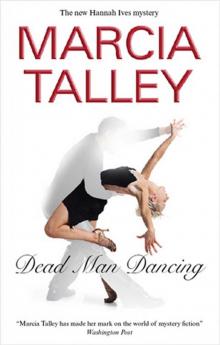 Dead Man Dancing
Dead Man Dancing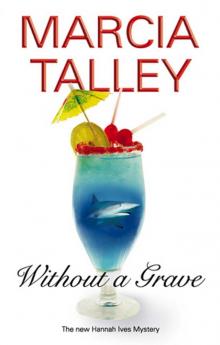 Without a Grave
Without a Grave Sing It to Her Bones
Sing It to Her Bones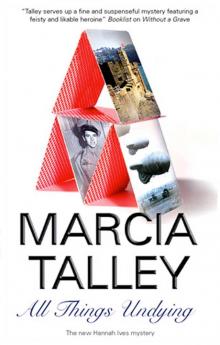 All Things Undying
All Things Undying Naked Came the Phoenix
Naked Came the Phoenix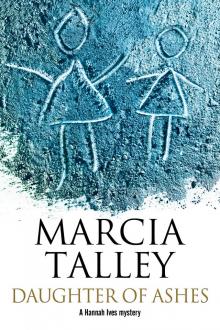 Daughter of Ashes
Daughter of Ashes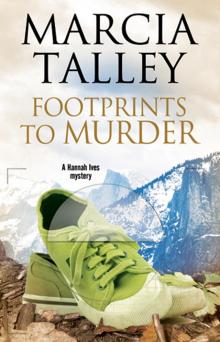 Footprints to Murder
Footprints to Murder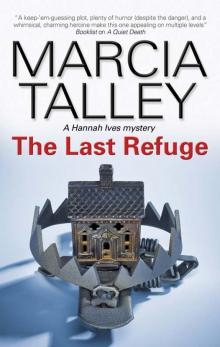 The Last Refuge
The Last Refuge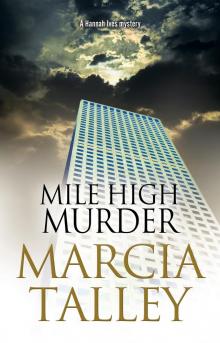 Mile High Murder
Mile High Murder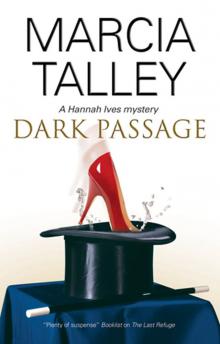 Dark Passage
Dark Passage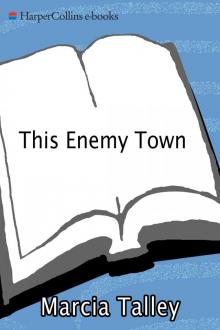 This Enemy Town
This Enemy Town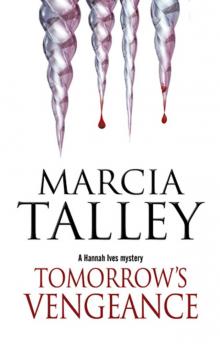 Tomorrow's Vengeance
Tomorrow's Vengeance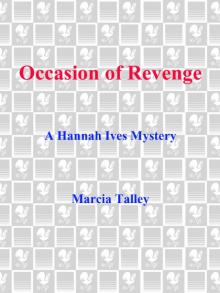 Occasion of Revenge
Occasion of Revenge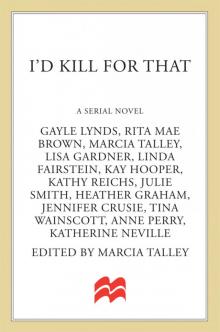 I'd Kill For That
I'd Kill For That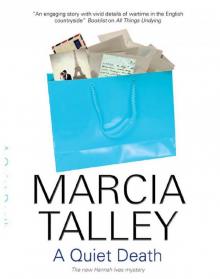 A Quiet Death
A Quiet Death